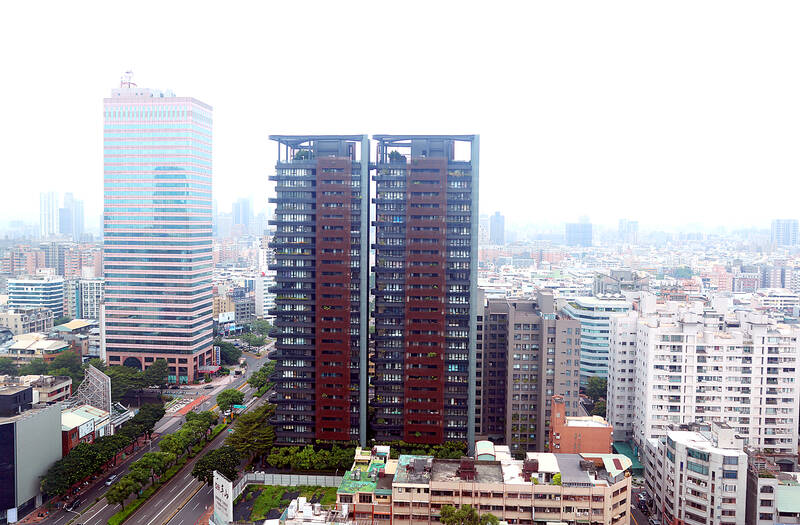The central bank’s credit control measures are cooling the housing market, as seen in a moderation of transactions, a shift in market sentiment and an increased ratio of first-home buyers.
The bank’s observations were detailed in a report it yesterday released to the legislature’s Finance Committee.
Speculative demand has weakened, leading to a slowdown in housing transactions, it said, adding that property transfers in July last year soared 31.8 percent year-on-year, but shrank 11.7 percent in December.

Photo: CNA
Similarly, mortgages rose 11 percent in August last year, but mitigated to 10.4 percent in December, despite a high sales season, it said.
Expectations for increases in home prices have tapered off, the bank said, citing a Cathay Financial Holdings Co (國泰金控) survey that showed home-purchasing interest fell 14 percentage points in the second half of last year.
The business confidence reading compiled by the Taiwan Institute of Economic Research (台經院) fell to 44.2 percent among domestic construction firms and property brokers, suggesting a gloomy outlook, it said.
Meanwhile, the proportion of first-home buyers rose to 61.4 percent in December last year, up from 57 percent in January 2023, as lenders prioritized transactions with borrowers with real housing demand, the bank said.
The Cabinet has pressed the central bank to leave first-home purchases unaffected in its bid to guide money away from real-estate lending that approached a record in August last year, fueling bubble concerns.
That prompted the central bank to introduce expansive credit controls the next month, lowering the loan-to-value ratios for non-first home purchases across Taiwan. A cash crunch followed and interest rates picked up noticeably.
The central bank said it conducted 160 inspections in the past five years of financial institutions, including banks, credit cooperatives, life insurance companies, bills finance companies and farmers’ associations, over their mortgage operations and land financing to rein in reckless lending.
Toward that aim, the central bank said it focused on issues such as the concentration of real-estate loans, mortgage interest rate pricing, lagged land development, and the reasons behind the delays. It has demanded corrections to maintain the financial system’s stability and health.
The bank said it would step up inspections this year to ensure lenders carry out their own proposed measures to help bring down real-estate lending.
It would also continue monitoring the housing market and adopt tightening measures, if necessary, it added.

Taiwan’s rapidly aging population is fueling a sharp increase in homes occupied solely by elderly people, a trend that is reshaping the nation’s housing market and social fabric, real-estate brokers said yesterday. About 850,000 residences were occupied by elderly people in the first quarter, including 655,000 that housed only one resident, the Ministry of the Interior said. The figures have nearly doubled from a decade earlier, Great Home Realty Co (大家房屋) said, as people aged 65 and older now make up 20.8 percent of the population. “The so-called silver tsunami represents more than just a demographic shift — it could fundamentally redefine the

The US government on Wednesday sanctioned more than two dozen companies in China, Turkey and the United Arab Emirates, including offshoots of a US chip firm, accusing the businesses of providing illicit support to Iran’s military or proxies. The US Department of Commerce included two subsidiaries of US-based chip distributor Arrow Electronics Inc (艾睿電子) on its so-called entity list published on the federal register for facilitating purchases by Iran’s proxies of US tech. Arrow spokesman John Hourigan said that the subsidiaries have been operating in full compliance with US export control regulations and his company is discussing with the US Bureau of

Businesses across the global semiconductor supply chain are bracing themselves for disruptions from an escalating trade war, after China imposed curbs on rare earth mineral exports and the US responded with additional tariffs and restrictions on software sales to the Asian nation. China’s restrictions, the most targeted move yet to limit supplies of rare earth materials, represent the first major attempt by Beijing to exercise long-arm jurisdiction over foreign companies to target the semiconductor industry, threatening to stall the chips powering the artificial intelligence (AI) boom. They prompted US President Donald Trump on Friday to announce that he would impose an additional

China Airlines Ltd (CAL, 中華航空) said it expects peak season effects in the fourth quarter to continue to boost demand for passenger flights and cargo services, after reporting its second-highest-ever September sales on Monday. The carrier said it posted NT$15.88 billion (US$517 million) in consolidated sales last month, trailing only September last year’s NT$16.01 billion. Last month, CAL generated NT$8.77 billion from its passenger flights and NT$5.37 billion from cargo services, it said. In the first nine months of this year, the carrier posted NT$154.93 billion in cumulative sales, up 2.62 percent from a year earlier, marking the second-highest level for the January-September